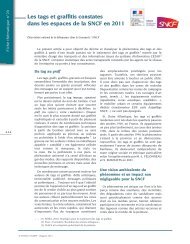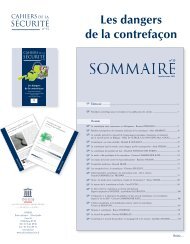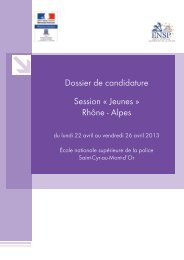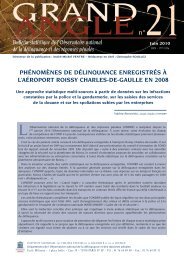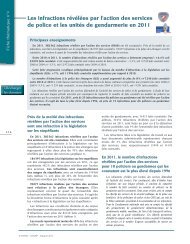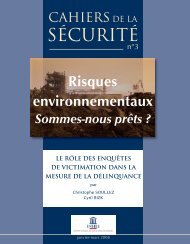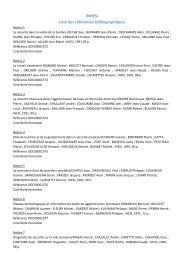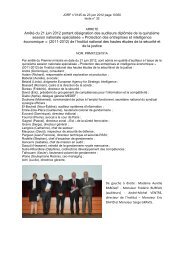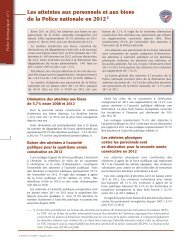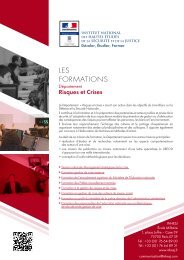Capacités d'absorption et gestion de crise - inhesj
Capacités d'absorption et gestion de crise - inhesj
Capacités d'absorption et gestion de crise - inhesj
Create successful ePaper yourself
Turn your PDF publications into a flip-book with our unique Google optimized e-Paper software.
Risques, inci<strong>de</strong>nts, acci<strong>de</strong>nts<br />
<strong>et</strong> catastrophes<br />
Réflexions sur les transferts notionnels<br />
entre les cindyniques, la sociologie <strong>de</strong>s risques<br />
<strong>et</strong> les étu<strong>de</strong>s <strong>de</strong> la sécurité<br />
Tawfik BOURGOU<br />
Le point <strong>de</strong> départ <strong>de</strong> c<strong>et</strong> article est le constat d’une double césure. D’abord, celle intervenue<br />
au début <strong>de</strong>s années 1990 avec l’élargissement <strong>de</strong> la notion <strong>de</strong> sécurité aux risques environnementaux,<br />
aux risques sociaux <strong>et</strong> politiques <strong>et</strong> à certains obj<strong>et</strong>s relevant jusqu’alors <strong>de</strong> la<br />
criminologie. Ensuite, celle intervenue après le 11 septembre 2001 centrée sur la globalisation<br />
<strong>de</strong>s risques. C<strong>et</strong> article propose d’analyser à l’aune <strong>de</strong> ce double mouvement, les transferts <strong>de</strong><br />
notions <strong>et</strong> <strong>de</strong> techniques <strong>de</strong>s sciences du danger, <strong>de</strong> la sociologie du risque vers les étu<strong>de</strong>s <strong>de</strong><br />
sécurité. En sens inverse, il analyse l’intégration <strong>de</strong>s risques sociaux <strong>et</strong> politiques, <strong>de</strong>s risques<br />
géopolitiques aux problématiques centrales <strong>de</strong>s sciences du danger <strong>et</strong> à la sociologie <strong>de</strong>s risques.<br />
Enfin, c<strong>et</strong> article trace les contours d’un bilan du transfert <strong>de</strong>s techniques, inspirées par la <strong>gestion</strong><br />
<strong>de</strong>s risques, transférées vers les étu<strong>de</strong>s <strong>de</strong> sécurité.<br />
Risks, inci<strong>de</strong>nts, acci<strong>de</strong>nts and disasters<br />
Thoughts on the transfer of concepts b<strong>et</strong>ween risk analysis, risk sociology and security studies<br />
This article stems from the observation that there are two distinct turning points. The first was at the beginning<br />
of the 1990s with the growth of security against environmental risks, social and political risks and some<br />
elements which used to be part of criminology. The second came after 9/11/2001, with the globalisation of risk.<br />
This article aims to analyse - against the yardstick of these two distinct changes - the transfers of certain concepts<br />
and techniques from danger studies and risk sociology towards security studies. It also analyses how sociopolitical<br />
and geopolitical risks have been integrated in the opposite direction into the core issues of danger<br />
sciences and risk sociology. Lastly, this article sk<strong>et</strong>ches a summary of the techniques transferred from risk<br />
management to security studies.<br />
Tawfik Bourgou<br />
Maître <strong>de</strong> Conférences en Science politique, faculté <strong>de</strong> Droit, université Jean Moulin, Lyon 3. Fondateur <strong>et</strong><br />
directeur du Centre d’étu<strong>de</strong>s <strong>de</strong> la politique <strong>et</strong> <strong>de</strong>s institutions américaines (CEPIA). Il a coordonné le programme<br />
<strong>de</strong> recherche : « Crise <strong>de</strong> l’expertise <strong>et</strong> nucléaire » <strong>et</strong> dirigé le programme « Biotechnologies, risques <strong>et</strong> décision ».<br />
Actuellement, il dirige le programme « Risques Globaux, politique étrangère <strong>et</strong> politique <strong>de</strong> défense américaines ».<br />
Il a publié Politiques du risque en 2005(Perspectives Juridiques) <strong>et</strong> Politologie du risque en septembre 2009.<br />
Il collabore aussi, dans le cadre d’un Master 2 Recherche, avec l’École nationale supérieure <strong>de</strong> la police (ENSP).<br />
Accès sommaire<br />
53



